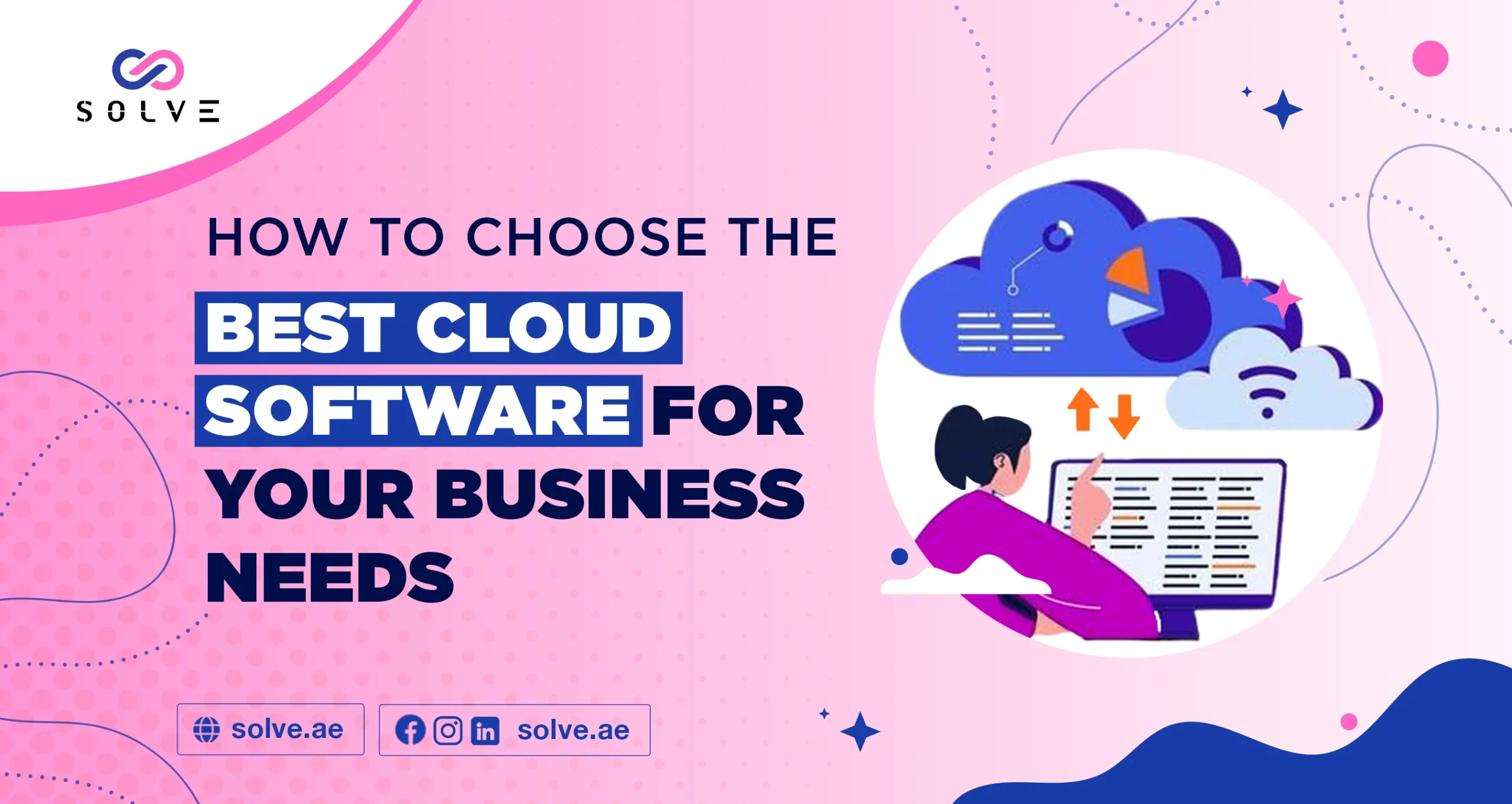- By Vanshika Choudhary
- April 7, 2025
In the modern business environment, cloud computing has emerged as one of the most significant mediums through which businesses now function, regardless of their size. The availability of scalable resources, flexible service models, and cost efficiencies has enabled companies to adapt rapidly to the indeed fast-changing market environment. For this reason, you would find several such software houses selling cloud software, thus making selection arduous. This guide will further enlighten you on ways to evaluate and choose the best cloud software suited for your business.
Understanding Cloud Computing
Before diving into the selection process, it’s essential to understand the basics of cloud computing. Cloud computing offers the provision of services in the form of computer systems on the Internet. Some of these include servers, storage, databases, software, and analytics. The main models of cloud computing are:
Infrastructure as a Service (IaaS): Provides virtualized computing resources over the internet. Users manage and configure the infrastructure.
Platform as a Service (PaaS): It provides the entire environment used for developing and deploying applications, leaving application development up to the users.
Software as a Service (SaaS): The internet provides software applications, freeing local installation and maintenance.
Factors to Consider in Choosing Cloud Software
Choosing the right cloud software would involve evaluating several key factors in line with business requirements and operating requirements.
-
Business Requirements
The first thing to consider before buying any cloud software is understanding the needs of your organization. Try to know if it is small or big, the nature of its operations, and if there are some specific requirements it has that are of particular interest to the industry it operates within. For instance, you may be in banking, and compliance with stringent regulations is critical, or in the health sector, where the other forms of compliance also apply. Identify needed IT services, whether infrastructural, platform, or software services. You might even want to check what other applications you would need, such as online accounting or CRM systems. Defining your needs helps to narrow down potential cloud providers to those that offer the needed services.
A business that relies heavily on data analytics, for instance, may have cloud service providers with extensive data processing and analytics tools on its list. Then again, if the organization has sensitive consumer data, it will also be looking at compliance issues regarding data protection laws such as GDPR and HIPAA.
-
Scalability and Flexibility
Cloud computing is defined by scalability and flexibility. Your cloud software must grow along with your business, allowing you to easily scale resources up or down. This is particularly important for businesses with rapid growth or seasonal variations in demand. Consider those providers that have flexible pricing and dynamic resource adjustment. It basically means that if your application starts to feel the load, scalability guarantees the performance expectations will be met. This also helps control costs since you would be liable to pay for what you have used. Flexibility remains an important attribute in the deployment model chosen, either public, private, or hybrid cloud, rewarding which one fits the best with your business strategy.
Just imagine a situation where you would have to scale your e-commerce platform very quickly, maybe twice the traffic during peak sales seasons. A scalable solution in the cloud guarantees keeping your website responsive to those customers, allowing them access to your platform while under heavy load.
-
Security and Compliance
The most important variable to consider in selecting cloud software is security. Ask whether the provider has adequate security features in place such as encryption, access management, and frequent audits. It is also relevant for the provider to comply with industry regulations, including GDPR, HIPAA, or PCI-DSS, depending on the type of business he operates. Also, consider the physical location where the provider stores systems and data; different areas of the world have different data protection and privacy legislation. For instance, the EU has stricter requirements in comparison to the U.S. This element can matter in your case, given that you deal with sensitive data. It is also a good idea to check the incident response plan of your service provider to ensure it can respond to a breach in security effectively.
A typical security structure will utilize many different factors for authentication, intrusion detection systems, secure online backup, and secure data recovery mechanisms. Compliance certifications will also reassure you that the provider is following industry standards regarding data security and privacy.
-
Performance
Here, the assessment of the cloud service providers in terms of their past performance becomes significant. Examine them in connection to uptime, response times, network performance, and storage performance. A credible cloud computing vendor should bundle strong SLA guarantees for high availability and low latency with its solution. Its network infrastructure, connectivity, and redundancy ought to be robust enough to ensure uninterrupted service. The performance of the computations is critical, as performance translates into how quickly your applications will respond, meaning the service provider should have the instance types that meet your exact compute needs, namely CPU, GPU, and memory capabilities.
For example, if your business is involved primarily in real-time data processing, you will require a cloud service provider that is able to guarantee low latency and very high throughput so that your applications will respond quickly to user requests and at the same time handle a large volume of data.
-
Integration and Compatibility
Smooth integration with existing infrastructure and tools is necessary to enable the smooth transition to cloud computing. Verify that the cloud software is well-integrated with your on-premise systems and applications. It will prevent errors and disruption of service and make it much easier to manage your environment. Analyze the integration capabilities that such a provider offers, looking into the APIs and other integration tools to facilitate such connectivity with the other applications. Examine the compatibility of the provider services on multiple devices and platforms so that your team has access to cloud services from anywhere on any device.
For example, if your team utilizes Microsoft Office tools, a cloud provider that works well with Microsoft products will streamline workflows and improve productivity among workers. Along similar lines, ensuring compatibility with mobile devices allows your team to work remotely without any disruptions.
-
Pricing and Cost Model
Price is usually on a per-use basis for cloud services, which can often prove to be affordable. Nevertheless, knowing the pricing model and ensuring that it is within budget is essential. Certain providers have free tiers or give discounts based on a commitment in time. Calculate the costs for the various resources such as compute instances, storage, and data transfer. Pricing models change significantly from one provider to another; therefore, it is important to compare costs and select a region with good billing transparency and very useful cost management tools. It also helps to prevent unforeseen costs and ensures that your cloud spending remains within budget.
For instance, if you would expect your usage pattern to change, a provider with pay-as-you-go facilities will most likely turn out to be more pocket-friendly than one with upfront commitments. You could also save cloud costs using cost management tools for identifying unused resources and automating savings strategies.
-
Support and Service
Good customer support has importance. Providers must offer responsive support on a variety of issues (for example, phone, email, or even chat), as well as the availability, desirability, and usability of documentation and tutorials for self-service. A provider that has such a strong support ecosystem will quickly remove most issues with little downtime and ensure the operation of your cloud services.
Hence, should you experience a technical glitch after business hours, you will depend on having support that is available all day, every day, and, in due time, get your systems restored, even at non-peak times. Check out latest blog post on What are the main benefits of using RFID asset tracking over traditional methods
Cloud Management Software
Cloud management software serves as an essential tool that optimizes your cloud environment without necessarily managing cloud services. These tools contribute to the monitoring of cloud resources, scaling, and security. Here are some things to keep in mind:
- Scalability: The ability to scale resources on demand.
- Security and compliance: Includes encryption and compliance certificates.
- Compatibility: Integration with existing systems and tools.
- Interoperability: Multi-cloud compatibility.
Cloud management platforms help streamline operations by offering automation in resource allocation and cost optimization duties. The generated performance metrics also provide meaningful information substantiating your decision-making regarding cloud infrastructure.
Implementation of Basic Best Practices
After selecting your cloud software best practices, ensure its successful implementation:
Detailed Planning: Evaluate your current infrastructure and the points where cloud services would provide value in making operations optimally effective. Identify the cloud service program that will be needed.
Train Your Team: Train your IT staff well on the new cloud environment to get maximum benefit.
Monitor Performances: Track performance on your cloud services so they are up to your standards.
Audit Security: Enforce and maintain strict security policies for data.
Optimize Cost: Keep wasteful spending in check with cost-management tools and improve Cloud Spend Optimization.
In Conclusion
One of the most influential choices you can make in cloud software is making it or failing the enterprise in terms of efficiency, scalability, and profitability. Understanding business requirements, scanning parameters, for example, scalability, security, and performance, and then appropriately sourcing cloud services and management tools will ensure that the full vigor of cloud computing is realized. Contact us as the cloud has entered into ranges for innovation and growth flexibly and economically ranging nowadays from great applications for small startups to big companies.




